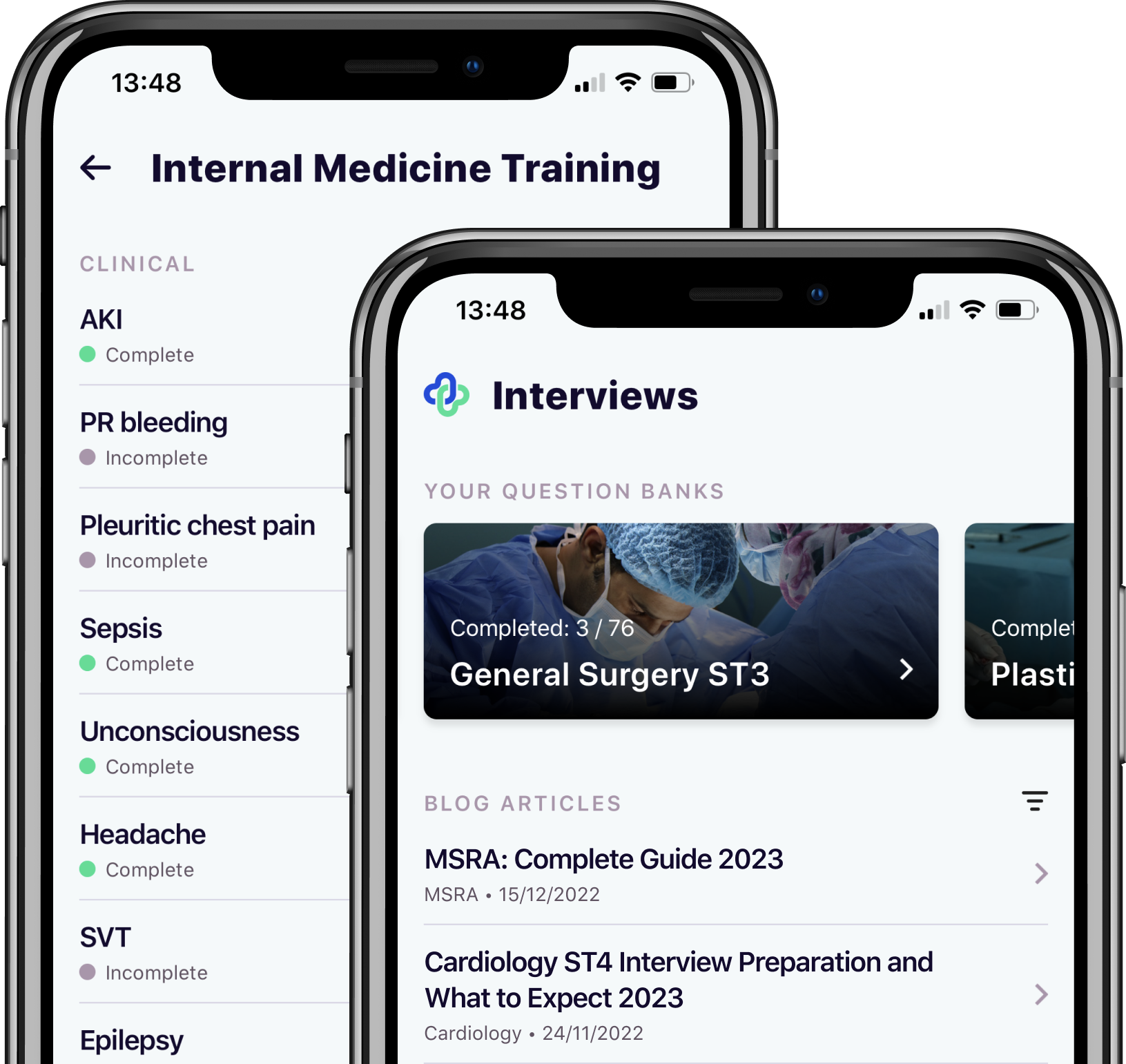
Endocrinology and Diabetes Mellitus ST4 Interview Guide 2025
If you’re hoping to secure an Endocrinology and Diabetes Mellitus ST4 interview during the 2025 recruitment window, this guide will provide everything you need to know about the application process, recruitment timeline, interview format and scoring, to help you succeed.
With continuous developments in the field, there are increasing opportunities available, making Endocrinology and Diabetes Mellitus ST4 an attractive proposition for doctors, and the competition ratios reflect this. For the 2024 recruitment window, there were 316 applications for 97 posts, resulting in a competition ratio of 3.26. This meant over three people were applying for each position.
We have put together this Endocrinology and Diabetes Mellitus ST4 Interview guide to help with your application submission and interview preparation, so you can focus on beating the competition.
Our Question Bank is coming soon! Sign up below for early access.
Endocrinology and Diabetes Mellitus ST4 Application
The Endocrinology and Diabetes Mellitus ST4 application window runs from 14 November – to 5 December 2024.
You must demonstrate in your application that you meet the essential entry criteria to be considered for interview. This includes holding an MRCP qualification – MRCP Part 1 must be successfully completed at the time of application and MRCP Part 2 by offer date – or equivalent. You must also have completed the internal medicine training (IMT) stage 1 programme or equivalent.
The 2025 person specification provides a full breakdown of the essential entry requirements for Endocrinology and Diabetes Mellitus ST4.
Endocrinology and Diabetes Mellitus ST4 Application Scoring
The following two sections will determine your application score:
- Self-assessment – Scores are awarded based on the options you choose in relation to your achievements and qualifications.
- Evidence – This will support your self-assessment selections and includes providing evidence documents.
Your self-assessment scores will then be verified by assessors using your evidence section and documents. The Endocrinology and Diabetes Mellitus ST4 Self Assessment section below provides more details on the points available for the application self-assessment.
Endocrinology and Diabetes Mellitus ST4 Recruitment Timeline
You can find the 2025 recruitment timeline for Endocrinology and Diabetes Mellitus ST4 below:
| Stage | Date |
|---|---|
| Specialty advertisements published | 13 November 2024 by 5pm |
| Applications open | 14 November 2024 at 10am |
| Applications close | 5 December 2024 at 4pm |
| Evidence upload window | 20 December 2024 – 6 January 2025 |
| Interview window | 2 – 4 April 2025 |
| First offers deadline | 15 April 2025 |
| Offer holding deadline | 23 April 2025 at 1pm |
| Offer upgrade deadline | 24 April 2025 at 1pm |
| Interview feedback release date | TBC |
| Posts commencing from | 6 August 2025 |
Endocrinology and Diabetes Mellitus ST4 Self Assessment
For the Endocrinology and Diabetes Mellitus ST4 self assessment, there will be 38 marks available across the following domains:
- Postgraduate degrees and qualifications
- MRCP(UK)
- Presentations
- Publications
- Teaching Experience
- Training in Teaching
- Quality improvement
There are also 2 marks available if your evidence is organised to a satisfactory level, making a total of 40 points.
In addition to this, you will be assessed on your “commitment to specialty” as part of the shortlisting process for Endocrinology and Diabetes Mellitus ST4 recruitment. There are 20 marks available for commitment to specialty, meaning it makes up 20/60 (~33%) of the total marks for shortlisting.
You can find out more about the self-assessment application scoring here.
Endocrinology and Diabetes Mellitus ST4 Interview Format
The Endocrinology and Diabetes Mellitus ST4 interview is split across two stations, consisting of two questions each. Two interviewers will score you on each of the four questions. You will also be judged on your communication skills; therefore, you’ll be scored across five areas in total.
Each question takes around 10 minutes. So, when you include the time between stations, you can expect the interview to last approximately 45-50 minutes.
You can find more details about each station and its questions below:
Station 1 – Question 1 – Clinical Scenario – Endocrinology
Before this question, you will be given a clinical scenario on Endocrinology, which will be two to three sentences long. You will have a small amount of time to review the scenario, before answering questions about it.
The clinical scenario will describe a hypothetical situation in which you’re involved. During your preparation time, you should think about the following:
- The next steps you would take
- Possible treatments
- How you would communicate with others involved in the scenario
- Any other factors you deem appropriate due to your experience
Station 1 – Question 2 – Medical Registrar Suitability
The second question will test your judgement on the non-clinical aspects of being a medical registrar. It focuses on two of the Capabilities in Practice (CiPs) from the Internal Medicine Stage 1 Curriculum. These are:
- Managing an acute unselected take
- Managing a multi-disciplinary team including effective discharge planning
During this part of the interview, the assessors will prompt a discussion. They’ll do this by asking you questions about your experience managing a team that’s caring for acute medical admissions. Within your answers, you should give examples of how you have managed this type of situation, providing further weight to your experience.
Station 2 – Question 1 – Clinical Scenario – Diabetes
Before this question, you’ll be given a clinical scenario that relates to diabetes and a hypothetical situation that you’re involved in. Like the Endocrinology scenario, you’ll have to answer questions related to the scenario.
Again, the scenario you’ll be given will only be a couple of sentences, so you’ll have the rest of the time to prepare for the questions. During this time, you should think about the following factors:
- The steps you would take within the scenario
- The potential treatments
- Any further information you would gather
- How you would communicate with patients, colleagues and family members within the scenario
Station 2 – Question 2 – Suitability & Commitment
This part of the assessment requires you to give a three-minute presentation. The content of your presentation should focus on the topic below:
‘What makes me suitable for higher specialist training in endocrinology & diabetes?’
Your presentation is an opportunity to convince the assessors that you’re suitable for the training post. Therefore, you should think about your career so far and the experience you’ve gained, as well as your portfolio, exam results and achievements.
You can’t use any form of visual representation, such as PowerPoint, but you can use cue cards to help you with your presentation.
Your presentation will be followed by a discussion about your training and experience. This seven-minute window will be another chance to show the interviewers how suitable you are for the specialty.
Station 2 – Question 3 – Communication Mark
This part of the interview isn’t strictly a question. However, you’ll be judged on how you communicate throughout the different interview stations and scored accordingly.
This will include the way you interact with patients, colleagues and family members during the scenarios, as well as how you communicate with the interviewers.
Endocrinology and Diabetes Mellitus ST4 Interview Scoring
The interviewers will score you for each section based on your performance against the expected level. The framework for awarding scores is as follows:
| Mark | Rating | Assessment |
|---|---|---|
| 1 | Poor | You are not considered appointable. |
| 2 | Area for concern | You performed below the level expected from a core level trainee applying to the specialty.
You are possibly unappointable, subject to discussion and performance in other areas. |
| 3 | Satisfactory | You performed at the level expected of a core level trainee applying to the specialty.
You are considered suitable for a higher specialty training post. |
| 4 | Good | You demonstrated an above average ability.
You are considered suitable for a higher specialty training post. |
| 5 | Excellent | You are a high performing trainee.
You are considered suitable for a higher specialty training post. |
Receiving a 3/5 for a question means you are at the expected level for a trainee, allowing you to proceed. While a 4/5 or 5/5 puts you above the expected level. However, receiving 1/5 or 2/5 means the assessors have concerns about your performance.
The total of these scores for all sections of the interview will give you a Raw Interview Score (RIS). With both interviewers giving you a separate score, your RIS will be between 10 and 50, before any weighting is applied.
To be considered an ‘appointable’ candidate, you must meet the following criteria:
- None of your ten interview scores can be 1/5
- A maximum of two of your ten interview scores can be 2/5
- Your RIS must be 30 or higher
Following your interview, a weighting is applied to your score for each section of the interview, as well as your application score. Your interview score makes up 80% of your total score (0.8 weighting), while your application score makes up the remaining 20% (0.2 weighting), meaning more focus is placed on your interview performance.
Certain sections of the interview are also more heavily weighted than others. For example, the two clinical scenario stations each have a 2.0 weighting, while the medical registrar suitability station and the suitability and commitment station have a 1 and 1.5 weighting, respectively.
You can find more information about the 2025 interview format and scoring here.
Good luck!

Take your subscriptions with you
Our mobile app allows you to access your interview and exam question banks wherever you are.




